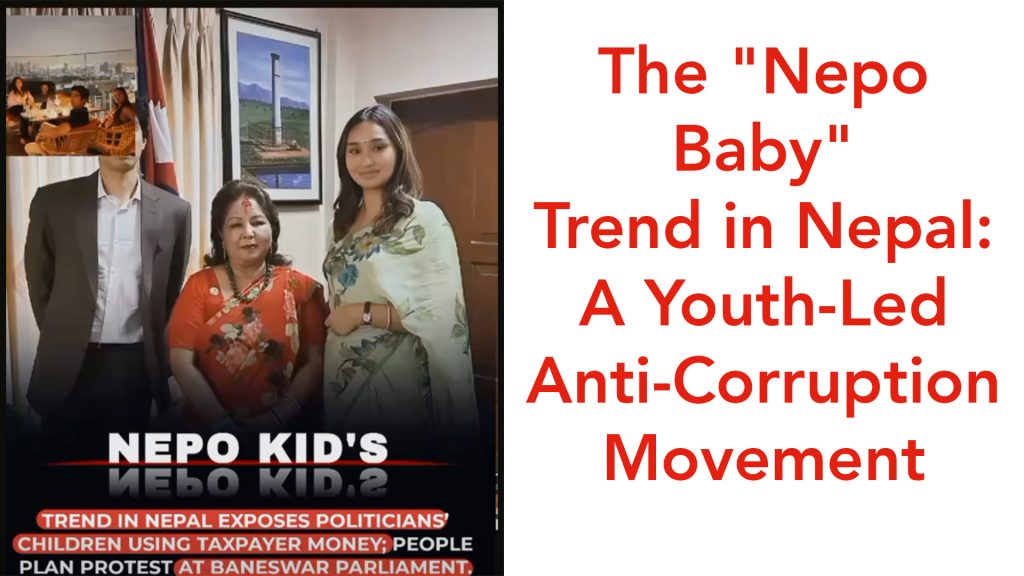The term “nepo baby” (short for “nepotism baby”) originated in Western pop culture, particularly Hollywood, around 2022. It refers to individuals—often celebrities—who gain advantages in their careers due to family connections rather than solely on merit. The phrase went viral after a Vulture article declared 2022 the “Year of the Nepo Baby,” highlighting stars like Lily-Rose Depp (daughter of Johnny Depp and Vanessa Paradis) and Maya Hawke (daughter of Uma Thurman and Ethan Hawke). It critiques inherited privilege and challenges the myth of a pure meritocracy. Globally, the term has spread to other industries, including politics and business, where it’s used to call out unearned advantages from family ties.
In Nepal, this concept has evolved into a powerful social media trend since early September 2025, transforming into a grassroots anti-corruption campaign. Young Nepalis, especially Gen Z, are using platforms like TikTok, Reddit, and Instagram to expose the lavish lifestyles of politicians’ children, accusing them of benefiting from corruption and taxpayer money. The trend, often called “Nepo Kid” or “Nepo Baby Nepal,” contrasts the elite’s luxury (e.g., foreign education, high-end cars, and vacations) with the daily struggles of ordinary citizens, many of whom migrate abroad for low-wage jobs or face poverty at home.
Origins and Spread in Nepal
The trend drew inspiration from similar movements in Southeast Asia, particularly the Philippines and Indonesia, where social media users targeted political dynasties and “nepo kids” amid protests against corruption. In Nepal, it exploded around September 3-6, 2025, amid widespread frustration over systemic graft, inequality, and a recent government ban on some social media platforms (which users are bypassing via VPNs). TikTok videos under hashtags like #PoliticiansNepoBabyNepal, #NoMoreCorruption, and #WakeUpChallenge have gone viral, amassing thousands of views. These short clips, often set to dramatic music with flashy effects, juxtapose images of politicians’ kids in designer clothes and abroad with visuals of Nepali workers departing for foreign jobs or returning in coffins.
Reddit’s r/Nepal and r/NepalSocial subreddits have become hubs for discussion, with posts like “Hoping this current nepo baby trend brings larger attitude change towards corruption” garnering hundreds of upvotes and comments. Users argue that while corruption scandals make headlines, the “nepo baby” lens personalizes the issue by spotlighting how public funds allegedly fund private extravagance.
Key Targets and Examples
The campaign focuses on children and relatives of high-profile figures from major parties like Nepali Congress, UML, and Maoist Centre. Videos and posts question the sources of wealth for:
- Jai Bir Deuba: Son of former PM Sher Bahadur Deuba, accused of flaunting luxury abroad.
- Shrinkhala Khatiwada: Daughter of former Health Minister Birodh Khatiwada, highlighted for her affluent lifestyle.
- Ganga and Smita Dahal: Daughter and granddaughter of PM Pushpa Kamal Dahal (Prachanda), criticized for expensive educations and vacations.
- Shivana Shrestha: Granddaughter of a former ambassador, engaged to a Deuba family member, called out for privilege.
- Others include children of former President Bidya Devi Bhandari, PM KP Sharma Oli, and lawmakers like Eknath Dhakal.
A common refrain in videos: “Leaders’ kids return from abroad with Gucci bags, while citizens’ children come back in boxes.” Users urge boycotting brands promoted by these “nepo kids” and archiving their social media posts to prevent deletions.
| Prominent “Nepo Kids” Targeted | Parent/Relative | Alleged Privilege Exposed |
|---|---|---|
| Jai Bir Deuba | Sher Bahadur Deuba (former PM) | Foreign luxury vacations, high-end cars |
| Shrinkhala Khatiwada | Birodh Khatiwada (former Minister) | Lavish lifestyle, branded goods |
| Smita Dahal | Pushpa Kamal Dahal (PM Prachanda) | Overseas education, extravagant parties |
| Shivana Shrestha | Kedar Bhakta Shrestha (former Ambassador) | Diplomatic perks, elite social circles |
| Ganga Dahal | Pushpa Kamal Dahal (PM Prachanda) | Funded abroad studies, designer fashion |
Impact and Broader Context
This isn’t just online venting—it’s fueling real action. On September 8, 2025 (today, per the current date), nationwide protests are planned in places like Maitighar Mandala (a symbolic protest site in Kathmandu) against corruption, with authorities granting permission despite the social media curbs. Organizers frame it as a “digital revolt” by youth, demanding accountability and an end to political dynasties. Searches for “corrupt politicians of Nepal” have spiked, and some posts call for writ petitions or investigations into wealth sources.
Critics, however, warn of risks like cyberbullying or defamation lawsuits, arguing it unfairly targets children for parents’ actions. One Reddit user noted: “It’s not about hating the kids, but exposing how corruption trickles down to their luxury while we suffer.” Supporters counter that flaunting wealth on social media invites scrutiny, especially in a country where youth unemployment and migration are rampant.
On X (formerly Twitter), the trend echoes with posts like: “Nepo babies live soft lives off corrupt ties, while we send money back home to Nepal… The world is rigged.” Another: “Gen-Z! Now millions of Gen-Z torches must burn in the country… Speak against wrongdoing!”
Why Now? Nepal’s Deeper Issues
Nepal ranks 108th on Transparency International’s 2024 Corruption Perceptions Index, with scandals involving billions in misappropriated funds (e.g., from infrastructure and health sectors). Youth frustration stems from economic stagnation: Over 1,000 Nepalis migrate daily for work, remitting $10 billion annually, yet inequality widens. The “nepo baby” trend taps into this, shifting focus from abstract corruption to visible privilege, much like how it disrupted Hollywood’s glamour narrative.
This movement could mark a turning point, similar to India’s 2011 anti-corruption protests led by Anna Hazare. Whether it leads to systemic change or fizzles depends on sustained pressure, but for now, it’s amplifying voices long silenced by elite power. As one TikTok caption puts it: “Where does our tax money go?”
The “Nepo Baby” Trend in Nepal: A Youth-Led Anti-Corruption Movement
The term “nepo baby” (short for “nepotism baby”) originated in Western pop culture, particularly Hollywood, around 2022. It refers to individuals—often celebrities—who gain advantages in their careers due to family connections rather than solely on merit. The phrase went viral after a Vulture article declared 2022 the “Year of the Nepo Baby,” highlighting stars like Lily-Rose Depp (daughter of Johnny Depp and Vanessa Paradis) and Maya Hawke (daughter of Uma Thurman and Ethan Hawke). It critiques inherited privilege and challenges the myth of a pure meritocracy. Globally, the term has spread to other industries, including politics and business, where it’s used to call out unearned advantages from family ties.
In Nepal, this concept has evolved into a powerful social media trend since early September 2025, transforming into a grassroots anti-corruption campaign. Young Nepalis, especially Gen Z, are using platforms like TikTok, Reddit, and Instagram to expose the lavish lifestyles of politicians’ children, accusing them of benefiting from corruption and taxpayer money. The trend, often called “Nepo Kid” or “Nepo Baby Nepal,” contrasts the elite’s luxury (e.g., foreign education, high-end cars, and vacations) with the daily struggles of ordinary citizens, many of whom migrate abroad for low-wage jobs or face poverty at home.
Origins and Spread in Nepal
The trend drew inspiration from similar movements in Southeast Asia, particularly the Philippines and Indonesia, where social media users targeted political dynasties and “nepo kids” amid protests against corruption. In Nepal, it exploded around September 3-6, 2025, amid widespread frustration over systemic graft, inequality, and a recent government ban on some social media platforms (which users are bypassing via VPNs). TikTok videos under hashtags like #PoliticiansNepoBabyNepal, #NoMoreCorruption, and #WakeUpChallenge have gone viral, amassing thousands of views. These short clips, often set to dramatic music with flashy effects, juxtapose images of politicians’ kids in designer clothes and abroad with visuals of Nepali workers departing for foreign jobs or returning in coffins.
Reddit’s r/Nepal and r/NepalSocial subreddits have become hubs for discussion, with posts like “Hoping this current nepo baby trend brings larger attitude change towards corruption” garnering hundreds of upvotes and comments. Users argue that while corruption scandals make headlines, the “nepo baby” lens personalizes the issue by spotlighting how public funds allegedly fund private extravagance.
Key Targets and Examples
The campaign focuses on children and relatives of high-profile figures from major parties like Nepali Congress, UML, and Maoist Centre. Videos and posts question the sources of wealth for:
- Jai Bir Deuba: Son of former PM Sher Bahadur Deuba, accused of flaunting luxury abroad.
- Shrinkhala Khatiwada: Daughter of former Health Minister Birodh Khatiwada, highlighted for her affluent lifestyle.
- Ganga and Smita Dahal: Daughter and granddaughter of PM Pushpa Kamal Dahal (Prachanda), criticized for expensive educations and vacations.
- Shivana Shrestha: Granddaughter of a former ambassador, engaged to a Deuba family member, called out for privilege.
- Others include children of former President Bidya Devi Bhandari, PM KP Sharma Oli, and lawmakers like Eknath Dhakal.
A common refrain in videos: “Leaders’ kids return from abroad with Gucci bags, while citizens’ children come back in boxes.” Users urge boycotting brands promoted by these “nepo kids” and archiving their social media posts to prevent deletions.
| Prominent “Nepo Kids” Targeted | Parent/Relative | Alleged Privilege Exposed |
|---|---|---|
| Jai Bir Deuba | Sher Bahadur Deuba (former PM) | Foreign luxury vacations, high-end cars |
| Shrinkhala Khatiwada | Birodh Khatiwada (former Minister) | Lavish lifestyle, branded goods |
| Smita Dahal | Pushpa Kamal Dahal (PM Prachanda) | Overseas education, extravagant parties |
| Shivana Shrestha | Kedar Bhakta Shrestha (former Ambassador) | Diplomatic perks, elite social circles |
| Ganga Dahal | Pushpa Kamal Dahal (PM Prachanda) | Funded abroad studies, designer fashion |
Impact and Broader Context
This isn’t just online venting—it’s fueling real action. On September 8, 2025 (today, per the current date), nationwide protests are planned in places like Maitighar Mandala (a symbolic protest site in Kathmandu) against corruption, with authorities granting permission despite the social media curbs. Organizers frame it as a “digital revolt” by youth, demanding accountability and an end to political dynasties. Searches for “corrupt politicians of Nepal” have spiked, and some posts call for writ petitions or investigations into wealth sources.
Critics, however, warn of risks like cyberbullying or defamation lawsuits, arguing it unfairly targets children for parents’ actions. One Reddit user noted: “It’s not about hating the kids, but exposing how corruption trickles down to their luxury while we suffer.” Supporters counter that flaunting wealth on social media invites scrutiny, especially in a country where youth unemployment and migration are rampant.
On X (formerly Twitter), the trend echoes with posts like: “Nepo babies live soft lives off corrupt ties, while we send money back home to Nepal… The world is rigged.” Another: “Gen-Z! Now millions of Gen-Z torches must burn in the country… Speak against wrongdoing!”
Why Now? Nepal’s Deeper Issues
Nepal ranks 108th on Transparency International’s 2024 Corruption Perceptions Index, with scandals involving billions in misappropriated funds (e.g., from infrastructure and health sectors). Youth frustration stems from economic stagnation: Over 1,000 Nepalis migrate daily for work, remitting $10 billion annually, yet inequality widens. The “nepo baby” trend taps into this, shifting focus from abstract corruption to visible privilege, much like how it disrupted Hollywood’s glamour narrative.
This movement could mark a turning point, similar to India’s 2011 anti-corruption protests led by Anna Hazare. Whether it leads to systemic change or fizzles depends on sustained pressure, but for now, it’s amplifying voices long silenced by elite power. As one TikTok caption puts it: “Where does our tax money go?”



